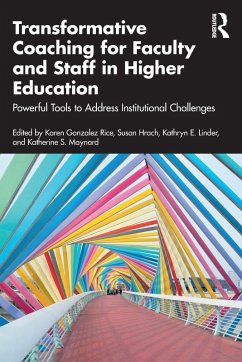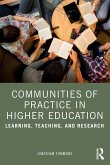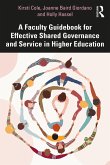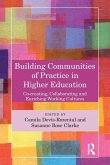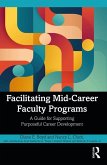Transformative Coaching for Faculty and Staff in Higher Education
Powerful Tools to Address Institutional Challenges
Herausgeber: Gonzalez Rice, Karen; Linder, Kathryn E.; Hrach, Susan
Transformative Coaching for Faculty and Staff in Higher Education
Powerful Tools to Address Institutional Challenges
Herausgeber: Gonzalez Rice, Karen; Linder, Kathryn E.; Hrach, Susan
- Broschiertes Buch
- Merkliste
- Auf die Merkliste
- Bewerten Bewerten
- Teilen
- Produkt teilen
- Produkterinnerung
- Produkterinnerung
This wide-ranging collection explores how to integrate coaching into higher education in ways that tackle some of the most pressing challenges facing institutions today.
Andere Kunden interessierten sich auch für
![Communities of Practice in Higher Education Communities of Practice in Higher Education]() Jonathan TummonsCommunities of Practice in Higher Education35,99 €
Jonathan TummonsCommunities of Practice in Higher Education35,99 €![A Faculty Guidebook for Effective Shared Governance and Service in Higher Education A Faculty Guidebook for Effective Shared Governance and Service in Higher Education]() Kirsti Cole (USA. Minnesota State University)A Faculty Guidebook for Effective Shared Governance and Service in Higher Education43,99 €
Kirsti Cole (USA. Minnesota State University)A Faculty Guidebook for Effective Shared Governance and Service in Higher Education43,99 €![Building Communities of Practice in Higher Education Building Communities of Practice in Higher Education]() Building Communities of Practice in Higher Education34,99 €
Building Communities of Practice in Higher Education34,99 €![The Artistry of Teaching in Higher Education The Artistry of Teaching in Higher Education]() The Artistry of Teaching in Higher Education34,99 €
The Artistry of Teaching in Higher Education34,99 €![Facilitating Mid-Career Faculty Programs Facilitating Mid-Career Faculty Programs]() Diane E. BoydFacilitating Mid-Career Faculty Programs44,99 €
Diane E. BoydFacilitating Mid-Career Faculty Programs44,99 €![The Faculty Guide to a Balanced and Harmonious Career The Faculty Guide to a Balanced and Harmonious Career]() Michele DiPietroThe Faculty Guide to a Balanced and Harmonious Career48,99 €
Michele DiPietroThe Faculty Guide to a Balanced and Harmonious Career48,99 €![The New Faculty Career Guide The New Faculty Career Guide]() Jodi PilgrimThe New Faculty Career Guide47,99 €
Jodi PilgrimThe New Faculty Career Guide47,99 €-
-
-
This wide-ranging collection explores how to integrate coaching into higher education in ways that tackle some of the most pressing challenges facing institutions today.
Produktdetails
- Produktdetails
- Verlag: Taylor & Francis Ltd
- Seitenzahl: 348
- Erscheinungstermin: 29. September 2025
- Englisch
- Abmessung: 229mm x 152mm x 19mm
- Gewicht: 504g
- ISBN-13: 9781041067726
- ISBN-10: 1041067720
- Artikelnr.: 74890908
- Herstellerkennzeichnung
- Libri GmbH
- Europaallee 1
- 36244 Bad Hersfeld
- gpsr@libri.de
- Verlag: Taylor & Francis Ltd
- Seitenzahl: 348
- Erscheinungstermin: 29. September 2025
- Englisch
- Abmessung: 229mm x 152mm x 19mm
- Gewicht: 504g
- ISBN-13: 9781041067726
- ISBN-10: 1041067720
- Artikelnr.: 74890908
- Herstellerkennzeichnung
- Libri GmbH
- Europaallee 1
- 36244 Bad Hersfeld
- gpsr@libri.de
Karen Gonzalez Rice is Professor of Art History at Connecticut College, USA. Susan Hrach is Director of the Faculty Center for the Enhancement of Teaching and Learning and Professor of English at Columbus State University, USA. Kathryn E. Linder is Associate Vice Chancellor for Academic Innovation and Strategy at the University of Colorado Denver, USA. Katherine S. Maynard is Director of the Teaching and Scholarship Hub at the University of Richmond, USA.
Section 1: Foundations of Coaching 1. Coaching Fundamentals 2. A Guide to
Training Programs and Pathways for Higher Education Coaches 3. The ABC and
D of Identifying and Addressing Ethical Issues in Higher Education Coaching
Section 2: Growing Coaching Skills 4. Getting Started: Putting Coaching
into Practice as Educational Developers 5. Cultural Alignment in the
Coaching Space 6. Faculty Coaching to Build Authentic Relationships 7.
Coaching Neurodivergent Clients on Campus 8. Embodied Strategies to Develop
Presence as a Coach 9. Integrating Your Skills and Expertise into
Established Coaching Practices Ethically Section 3: Applying Coaching
Skills to Specific Scenarios 10. Co-creating Learning Spaces for the
Future: A Coach Approach Framework 11. A Partnership and Coaching Model for
Teaching Observations 12. Coaching for Productivity and Project Management
13. Chairing Faculty through Organizational Change: A Coaching Informed
View 14. Reimagining Academic Writing through the Lens of Sustainable
Productivity Coaching Section 4: Coaching for Specific Audiences 15.
Thriving in the Middle: How Coaching Can Empower Higher Ed Administrators
16. Coaching Faculty Through Professional Burnout in Higher Education 17.
The Complexities of Coaching in Student Affairs: A Unique Opportunity 18.
Coaching Instructional Designers and IT Professionals in Higher Education
19. Developing an Awareness of the Structural Barriers at Play for Women of
Color Faculty: One Coach's Perspective Section 5: Coaching the Career
Lifecycle 20. Facilitating Faculty Acculturation: A Coaching Approach 21.
Fostering a Coaching Mindset and Culture with Academic Department Chairs
22. Coaching through a Career Curveball 23. Walking the Tightrope: Coaching
Faculty Clients Who Decide to Leave the University 24. A Call for
Enoughness at Mid-Career 25. Legacy Coaching for Late-Career Faculty
Section 6: Group, Team, and Peer Coaching Models 26. Unlocking Potential:
Group Coaching as a Strategic Tool to Enhance Organizational Effectiveness
27. Bringing a Coaching Mindset to Educational Development 28. Cultivating
a Coaching Culture: Improving Faculty Readiness for Boundary Spanning
Collaboration via Team Coaching 29. Developing Signature Coaching
Capacities to Invigorate Organizational Growth
Training Programs and Pathways for Higher Education Coaches 3. The ABC and
D of Identifying and Addressing Ethical Issues in Higher Education Coaching
Section 2: Growing Coaching Skills 4. Getting Started: Putting Coaching
into Practice as Educational Developers 5. Cultural Alignment in the
Coaching Space 6. Faculty Coaching to Build Authentic Relationships 7.
Coaching Neurodivergent Clients on Campus 8. Embodied Strategies to Develop
Presence as a Coach 9. Integrating Your Skills and Expertise into
Established Coaching Practices Ethically Section 3: Applying Coaching
Skills to Specific Scenarios 10. Co-creating Learning Spaces for the
Future: A Coach Approach Framework 11. A Partnership and Coaching Model for
Teaching Observations 12. Coaching for Productivity and Project Management
13. Chairing Faculty through Organizational Change: A Coaching Informed
View 14. Reimagining Academic Writing through the Lens of Sustainable
Productivity Coaching Section 4: Coaching for Specific Audiences 15.
Thriving in the Middle: How Coaching Can Empower Higher Ed Administrators
16. Coaching Faculty Through Professional Burnout in Higher Education 17.
The Complexities of Coaching in Student Affairs: A Unique Opportunity 18.
Coaching Instructional Designers and IT Professionals in Higher Education
19. Developing an Awareness of the Structural Barriers at Play for Women of
Color Faculty: One Coach's Perspective Section 5: Coaching the Career
Lifecycle 20. Facilitating Faculty Acculturation: A Coaching Approach 21.
Fostering a Coaching Mindset and Culture with Academic Department Chairs
22. Coaching through a Career Curveball 23. Walking the Tightrope: Coaching
Faculty Clients Who Decide to Leave the University 24. A Call for
Enoughness at Mid-Career 25. Legacy Coaching for Late-Career Faculty
Section 6: Group, Team, and Peer Coaching Models 26. Unlocking Potential:
Group Coaching as a Strategic Tool to Enhance Organizational Effectiveness
27. Bringing a Coaching Mindset to Educational Development 28. Cultivating
a Coaching Culture: Improving Faculty Readiness for Boundary Spanning
Collaboration via Team Coaching 29. Developing Signature Coaching
Capacities to Invigorate Organizational Growth
Section 1: Foundations of Coaching 1. Coaching Fundamentals 2. A Guide to
Training Programs and Pathways for Higher Education Coaches 3. The ABC and
D of Identifying and Addressing Ethical Issues in Higher Education Coaching
Section 2: Growing Coaching Skills 4. Getting Started: Putting Coaching
into Practice as Educational Developers 5. Cultural Alignment in the
Coaching Space 6. Faculty Coaching to Build Authentic Relationships 7.
Coaching Neurodivergent Clients on Campus 8. Embodied Strategies to Develop
Presence as a Coach 9. Integrating Your Skills and Expertise into
Established Coaching Practices Ethically Section 3: Applying Coaching
Skills to Specific Scenarios 10. Co-creating Learning Spaces for the
Future: A Coach Approach Framework 11. A Partnership and Coaching Model for
Teaching Observations 12. Coaching for Productivity and Project Management
13. Chairing Faculty through Organizational Change: A Coaching Informed
View 14. Reimagining Academic Writing through the Lens of Sustainable
Productivity Coaching Section 4: Coaching for Specific Audiences 15.
Thriving in the Middle: How Coaching Can Empower Higher Ed Administrators
16. Coaching Faculty Through Professional Burnout in Higher Education 17.
The Complexities of Coaching in Student Affairs: A Unique Opportunity 18.
Coaching Instructional Designers and IT Professionals in Higher Education
19. Developing an Awareness of the Structural Barriers at Play for Women of
Color Faculty: One Coach's Perspective Section 5: Coaching the Career
Lifecycle 20. Facilitating Faculty Acculturation: A Coaching Approach 21.
Fostering a Coaching Mindset and Culture with Academic Department Chairs
22. Coaching through a Career Curveball 23. Walking the Tightrope: Coaching
Faculty Clients Who Decide to Leave the University 24. A Call for
Enoughness at Mid-Career 25. Legacy Coaching for Late-Career Faculty
Section 6: Group, Team, and Peer Coaching Models 26. Unlocking Potential:
Group Coaching as a Strategic Tool to Enhance Organizational Effectiveness
27. Bringing a Coaching Mindset to Educational Development 28. Cultivating
a Coaching Culture: Improving Faculty Readiness for Boundary Spanning
Collaboration via Team Coaching 29. Developing Signature Coaching
Capacities to Invigorate Organizational Growth
Training Programs and Pathways for Higher Education Coaches 3. The ABC and
D of Identifying and Addressing Ethical Issues in Higher Education Coaching
Section 2: Growing Coaching Skills 4. Getting Started: Putting Coaching
into Practice as Educational Developers 5. Cultural Alignment in the
Coaching Space 6. Faculty Coaching to Build Authentic Relationships 7.
Coaching Neurodivergent Clients on Campus 8. Embodied Strategies to Develop
Presence as a Coach 9. Integrating Your Skills and Expertise into
Established Coaching Practices Ethically Section 3: Applying Coaching
Skills to Specific Scenarios 10. Co-creating Learning Spaces for the
Future: A Coach Approach Framework 11. A Partnership and Coaching Model for
Teaching Observations 12. Coaching for Productivity and Project Management
13. Chairing Faculty through Organizational Change: A Coaching Informed
View 14. Reimagining Academic Writing through the Lens of Sustainable
Productivity Coaching Section 4: Coaching for Specific Audiences 15.
Thriving in the Middle: How Coaching Can Empower Higher Ed Administrators
16. Coaching Faculty Through Professional Burnout in Higher Education 17.
The Complexities of Coaching in Student Affairs: A Unique Opportunity 18.
Coaching Instructional Designers and IT Professionals in Higher Education
19. Developing an Awareness of the Structural Barriers at Play for Women of
Color Faculty: One Coach's Perspective Section 5: Coaching the Career
Lifecycle 20. Facilitating Faculty Acculturation: A Coaching Approach 21.
Fostering a Coaching Mindset and Culture with Academic Department Chairs
22. Coaching through a Career Curveball 23. Walking the Tightrope: Coaching
Faculty Clients Who Decide to Leave the University 24. A Call for
Enoughness at Mid-Career 25. Legacy Coaching for Late-Career Faculty
Section 6: Group, Team, and Peer Coaching Models 26. Unlocking Potential:
Group Coaching as a Strategic Tool to Enhance Organizational Effectiveness
27. Bringing a Coaching Mindset to Educational Development 28. Cultivating
a Coaching Culture: Improving Faculty Readiness for Boundary Spanning
Collaboration via Team Coaching 29. Developing Signature Coaching
Capacities to Invigorate Organizational Growth

